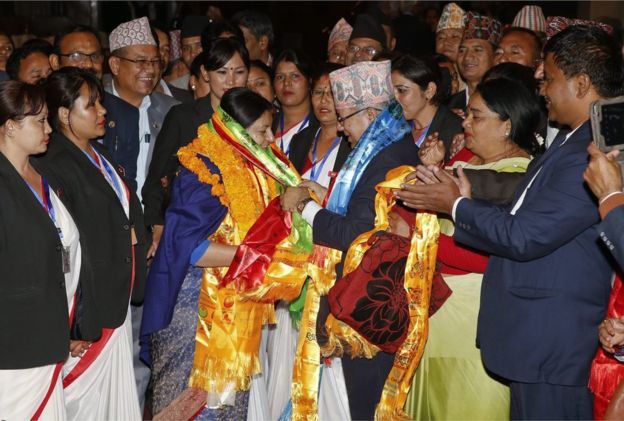Two Firsts For Nepal: Elects Rights Activist As First Woman President: Reaches Out To China For Fuel
Nepal elects first female President
NEW DELHI: Nepal's parliament has elected women's rights campaigner Bidhya Devi Bhandari as its first female president. Bhandari is currently the vice-chair of the ruling Communist Party of Nepal (United Marxist Leninist). Meanwhile, Nepal has signed an agreement with China on supply of petroleum products to alleviate shortages caused by a blockade on land routes by India, effectively ending India’s historic status of Nepal’s sole fuel provider.
On Wednesday, Bidhya Devi Bhandari was elected Nepal’s new President. "I announce that Bidhya Devi Bhandari has been elected to the post of Nepal's president," said Speaker Onsari Gharti Magar, to loud cheers from parliamentarians. Bhandari defeated her opponent Kul Bahadur Gurung by 327 to 214 votes to become Nepal’s ceremonial head of State.
"I will do my best to protect the constitution and work for the country's development and prosperity," she told reporters.
Bhandari is the second person to serve the mainly ceremonial role of President in Nepal, and her election is being described as a milestone for the country that recently promulgated a new constitution, declaring itself a secular nation.
Bhandari served as Nepal’s defence minister from 2009 to 2011. She is a close ally of the country’s Prime Minister, KP Sharma Oli, who was elected this month. In the pre democracy era, she worked on women’s rights issues underground, after getting elected to parliament after her politician husband, fellow communist Madan Bhandari, was killed in a mysterious car crash.
After entering politics, she continued to fight for women’s rights, working to ensure 33 percent female representation in Parliament.
Bhandari, however, has her detractors, with many saying that she supports citizenship laws that are anti-women. "Some may say she is not the most feminist person to become president," said Guna Raj Luitel, editor of Nepali newspaper Nagarik Daily (as quoted in The Global Post), "but she is a single woman in a male-dominated society who has made such progress in politics and that is quite commendable.”
Bhandari replaces Ram Baran Yadav, who was the country's first elected president in 2008 after Nepal abolished its monarchy.
Most importantly, Bhandari’s election represents the changing face of Nepal, which struggled to arrive at a new constitution for almost a decade after ending a bitter civil war. Bhandari is the second woman to be elected to a high political post since the adoption of the new constitution in September this year, after Magar became the country's first female Speaker earlier this month.
The new constitution, meant to bolster peace and ease Nepal's transformation to a democratic republic, declared Nepal as a secular country. This has reportedly been a major point of contention for Nepal’s closest ally, India, with reports indicating that the Indian government had levelled pressure on Nepal to declare itself a Hindu Rashtra.
The Indian government, on its part, maintains that its opposition to the new constitution is not to do with Nepal’s status as a Hindu nation, but linked to security concerns as Madhesis are protesting the new constitution in the Terai region of Nepal bordering India.
The Madhesis state that the new constitution will leave them under represented in Parliament, and have been staging protests for the last month. Violent clashes have led to almost 40 deaths.
In connection with the above, India reportedly imposed an ‘unofficial’ blockade at the Birgunj trade checkpoint, effectively cutting off vital supplies -- including petroleum products -- to Nepal.
India denied imposing a blockade, saying that the restrictions on movement of goods and supplies was linked to security concerns over the violence led by the Madhesis along the border.
Nepal, however, maintained that India had imposed a blockade. "Continued obstruction at border customs points and the IOC halting supply of petroleum products have created an abnormal situation in fuel supply," Nepal’s home ministry said in a statement.
The fact that the pressure that India probably hoped to level through the blockade has backfired was cemented by Nepal signing an agreement with China on supply of petroleum products to alleviate shortages.
"Nepal Oil Corporation (NOC) and China National United Fuel Corporation formalized a long-term commercial agreement in Beijing on Wednesday afternoon," a senior Nepali bureaucrat told Times of India. Under the agreement, the bureaucrat added, China will supply fuel at international rates, which Kathmandu might find cheaper than its imports from India. To begin with, China will fulfill at least a third of Nepal's requirements.





